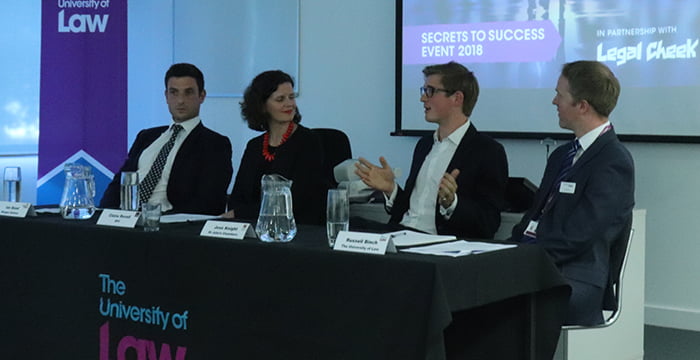Lawyers from Burges Salmon, RPC, St John’s Chambers and ULaw share the secrets to their success

With exams now over and training contract deadline day fast-approaching, students are turning their attention to the lengthy application process.
Gathering at The University of Law’s (ULaw) Bristol campus earlier this month to discuss what lawyers of the future should be thinking about in Legal Cheek’s Secrets to Success event were: Ian Bond, a trainee solicitor at Burges Salmon, Claire Revell, a senior associate at RPC, Joss Knight, a junior barrister at St John’s Chambers and Russel Binch, tutor at ULaw.
Law isn’t just in London
With rent in London seemingly out of control, it’s no surprise that students are looking further afield. Bristol was recently named as the largest legal hub outside London and Revell — who is Bristol-based — has experienced this growth first-hand. She spoke about how RPC has grown from 30 staff in Bristol when the office opened six years ago, to over 150 today. Binch was previously a partner in Stephenson Harwood’s London office before joining ULaw in Bristol. He identified the South Western work-life balance as one of the key attractions for the switch because “there was a growing appreciation that you cannot afford to be complacent in London”.
Knight, who specialises in a broad range of commercial and chancery work at St John’s Chambers, cited the creation of new business and property courts in Bristol as a key driver of change: “Large litigation cases from the south-west which previously may have been transferred to London will now be heard where the case originates — in Bristol.” And even in more complex cases, a specialist judge, he noted, will come to Bristol, instead of the case going to London.
Think evolution(AI)ry, not revolutionary
Artificial intelligence (AI) generates buzz among students. The panel sought, however, to temper the hype. Burges Salmon trainee Bond told the audience that although significant investment is being made into the tech, AI is still in its infancy. “It’s not impacting solicitors too much — but has reduced the administrative burden that falls on junior lawyers,” he said. Revell, whose firm utilises AI for tasks such as document review, agreed.
ULaw’s Binch views AI as a resource that “facilitates” rather than “disrupts” the work largely done by junior lawyers. But it’s the clients that are driving the disruption, said Binch, “they’re lightyears ahead — which is good news for traditional legal advice. They’ll come to us when the robots get it wrong!”
Demystifying ‘commercial awareness’
The panel were keen to offer guidance on what commercial awareness actually is — a concept that can confuse many training contract hunters. Bond said students should think carefully about what it is the client wants and gear advice towards their particular industry.
Revell said prospective trainees should consider the “real-life business impact” of a situation and not just the legal side. RPC encourages this approach in trainees by having them contribute to a business blog. Recent posts have looked at the royal wedding, considering everything from the ‘Meghan Markle effect’ on retailers as consumers flock to follow her trends to the tourism surge brought by royal fanatics. Binch placed emphasis on the “awareness” aspect of the phrase, suggesting that students do not necessarily need to know the nuts and bolts of financial planning and commercial decision-making processes, but do need to demonstrate an understanding that law is a business.
Make vacation schemes count
With final term drawing to a close, students will be looking to secure legal work experience over the summer. Binch appreciated that although there is a fair amount of “drudge” work in some placements, it’s important to perform well and have a smile on your face. And if you can do the “grunt” work well, you’re more likely to be offered higher level work, he said. A big mistake some vac schemers make is thinking that they must say “yes to everything”, said Revell, who is looking for “a safe pair of hands” and honesty if you’re unable to meet a deadline. For prospective pupils, Knight had some practical advice:
“Come armed with questions but know when to blend into the background and when to step forward. It’s a difficult judgement to call, but you don’t want to get in the way of someone doing the job.”
Share your story
Research shows the average person will work for at least six different companies across their lifetime, and there was plenty of interest about switching to a career in law later in life.
Bond switched to law after working in business development for a biotech company. He said:
“There is a natural tendency for career changers to be hypercritical about what they don’t have. Instead, try and help firms understand the value you will bring. Explain that: If you take me on, you can get x, y or z for free.”
Revell asks applicants to think about their past experience and the skills they will have acquired — it may not be immediately obvious to someone reading a CV that a job has transferable skills. Binch, who was involved in the recruitment process at Stephenson Harwood, was more direct:
“I want my lawyers to be three-dimensional. We can all trot out buzz words — saying that you have the skills required — but prove it. I’m looking for a deep, well-rounded story that gives meaning to these buzz words, rather than a scattergun approach — and that is what will attract a law firm.”
“Have a well-rounded story which you can drill down into deeply. Don’t take a scattergun approach and trot out buzzwords.” ULaw tutor Russell Binch gives advice to training contract hopefuls at a recent #LegalCheekLive Secrets to Success event ?️
Posted by Legal Cheek on Wednesday, 18 July 2018
About Legal Cheek Careers posts.


